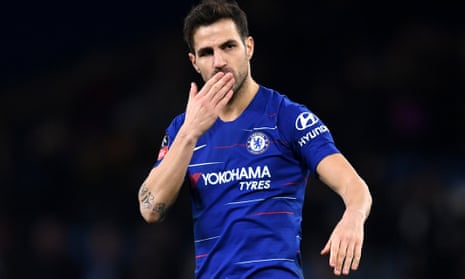After Cesc Fàbregas had uttered his fond farewells to Chelsea on Friday night, the club’s social media team posted a collection of his greatest assists. Most were 40- or 50-yard passes, launched from within his own half. Yet whether the ball was caressed or caned, sent skyward or scuttling along the ground, it always landed precisely on the foot of a teammate. It provoked the same quiet awe as seeing a major golf winner repeatedly hit a flop wedge to within four feet of the flag, no matter how dicey the approach, or dangerous the lie.
That, I think, is how the Premier League will remember the Spaniard. Sitting deep, unlocking defences, redefining the art of the assist. Yet at his peak, somewhere in his early to mid 20s, Fàbregas was much more than that. Not only a conjuror but a conductor too, able to dictate the tempo and flow of a game as well as change it in an instant – and also buzzy enough to get around the pitch and in opponent’s faces.
And boy, could he could create. According to data from Opta between 2006-07 and 2010-11 no one in Europe’s five biggest leagues managed more assists than Fàbregas’s 60 – or created more than his 466 chances. Not Lionel Messi. Not Xavi or Mesut Özil, Frank Lampard or Steven Gerrard, although they all made the top 10. Fàbregas also averaged 3.5 chances created for every 90 minutes he played – again better than anyone else in Europe.
How many more goals might Arsenal have scored if Thierry Henry and Fàbregas had stayed together? Instead the Spaniard had to service Nicklas Bendtner, a Robin Reliant of a striker compared to Henry’s Lamborghini, as well as Andrey Arshavin and Eduardo. Despite that, he continued to excel, contributing 15 goals and 13 assists from 27 games in the Gunners’ 2009-10 season despite several injuries. As Ted Knutson, the head of the football consultancy StatsBomb, who later did statistical analysis on Fàbregas’s merits for Barcelona, puts it: “That guy was the best young midfielder in the world. He was also the best attacking passer the Premier League has ever seen.”
Looking back, it is bizarre that Fàbregas was selected only twice for the PFA’s team of the year. Then again, he is in good company given that Paul Scholes was also picked only twice.
Perhaps Fàbregas is not rated as highly as he deserves because, like Wayne Rooney and Mike Tyson, his developmental trajectory was so steep and spectacular that his best years came so early and are now long behind him. Remember, he was Arsenal’s youngest ever player, aged 16 and 177 days, one of several debutants in a Carling Cup victory over Rotherham in October 2003, and became the club’s youngest scorer two months later. That goal came in a 5-1 mauling of an experienced Wolves side, after which my colleague Jon Brodkin hailed Fàbregas’s performance and purred: “This was men against boys all right, and the men were outclassed”.
The next day Brodkin spoke to Arsenal’s head of youth development, Liam Brady, who warned him that the Gunners’ starlets would be “20 or 21” before they could “handle the physical side” of the Premier League. Yet by August 2004 Fàbregas, at 17, had forced his way into the Invincibles team that had just gone unbeaten in winning the Premier League. Shortly afterwards he made one of the best assists of his career, a stunning no-look reverse pass to Freddie Ljungberg in a thrilling 5-4 victory over Spurs. There were many more to come.
Yet when it comes to assessing his place in the pantheon his time at Barcelona always counts again him. Being played as a false nine always felt a little false. During his three years at the Camp Nou, Fàbregas still ranked in the top six in Europe for assists, behind only Messi, Özil, Ángel Di María, Franck Ribéry and Eden Hazard, despite several injuries. And as Pep Guardiola put it: “When Cesc has the ball, in one second he is the most special player in the world for that ball in behind.”
Nowadays there is also a recency bias when assessing Fàbregas’s legacy. In the past two years he has become slower of mind and foot, and inevitably less effective. But it is not so long ago that he set up Andrés Iniesta’s winner in the 2010 World Cup final, crossed for David Silva’s opener in Spain’s 4-0 thumping of Italy in the Euro 2012 final, or had 18 assists during Chelsea’s title-winning 2014-15 season – the joint-second highest in Europe behind Kevin De Bruyne.
How Chelsea could do with that version of Fàbregas now. No one has passed more in the Premier League than Jorginho this season, but he does not have a single assist. Four Chelsea defenders are also in the top 10 of passes played, highlighting – as Jermaine Jenas pointed out on Match of the Day – the fact that Maurizio Sarri’s side are overplaying at the back and not getting the ball forward quickly enough.
That is a charge you could never level at Fàbregas. No wonder Henry is hoping that the Spaniard, who provided so many assists during their time together at Arsenal, can help him once more by getting Monaco out of a relegation dogfight. Do not be surprised if the 31-year-old locksmith still proves capable of unpicking the toughest of defences.

